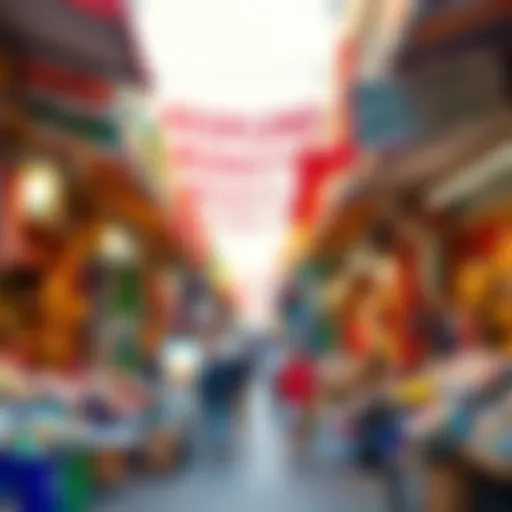Dubai Ramadan 2024: Key Dates and Cultural Insights


Intro
In Dubai, Ramadan is more than just a month of fasting; it is a period steeped in cultural significance, community bonding, and vibrant traditions. As the holy month approaches in 2024, it presents a unique blend of spiritual reflection and practical adjustments for residents and visitors alike. This article delves into the intricacies of Ramadan in Dubai, shedding light on key dates, cultural practices, and how they impact daily life and economic activities in the emirate.
With Ramadan serving as a focal point in the Islamic calendar, understanding its implications is crucial, especially for investors and residents wishing to navigate the local landscape effectively. The significance of this month trickles down to various sectors, notably real estate, which sees a shift in activity and opportunity during this time.
As we explore this topic, we aim to provide a comprehensive guide that not only highlights pivotal dates but also unpacks the investment prospects that arise through the distinct practices and communal spirit of Ramadan in 2024.
Market Insights
Current Trends in Dubai Real Estate
The real estate market in Dubai shows signs of dynamism as we edge closer to Ramadan 2024. Recent trends indicate an upsurge in interest from both local and international buyers. This could be attributed to the city’s stability as a global hub and the ongoing development of infrastructure. Notably, the demand for short-term rentals tends to spike during Ramadan, as families often host gatherings and seek accommodations for relatives visiting.
The following factors contribute to the current trends:
- Festive Demand: The desire for larger living spaces or rental homes that can comfortably accommodate family gatherings.
- Community Engagement: Many developers build community-focused residences reflecting the spirit of togetherness during Ramadan.
- Tourism Flux: The influx of tourists seeking to experience Ramadan in Dubai adds a layer of interest in real estate investments.
Economic Factors Impacting Property Values
The economic landscape during Ramadan also plays a pivotal role in real estate trends. Businesses often adapt their services and offerings during this month, influencing cash flow within the property sector. Factors to consider include:
- Seasonal Revenue Changes: As nights become more vibrant with gatherings, retail and dining sectors thrive, which enhances nearby property values.
- Increased Spending: The disposable income available during Ramadan can lead to a rise in investments in luxury or high-end properties.
- Foreign Investment: The month can see upticks in foreign investments as expatriates look to secure assets in a burgeoning market.
"Ramadan serves not only as a period for spiritual growth but also as a catalyst for economic activities in Dubai. Investors should keep this in mind when making property decisions."
Investment Guides
Tips for First-Time Buyers
For those new to the real estate market in Dubai, Ramadan opens doors to potential bargains and opportunities. Here are savvy tips for first-time buyers looking to make the most of this unique period:
- Understand Timing: Be aware of the market pace during Ramadan. Many sellers may be more willing to negotiate, especially post-Iftar.
- Explore Community-Focused Developments: Look for properties that promote a sense of community through events and shared spaces, which are crucial during Ramadan.
- Conduct Thorough Research: Investigate emerging neighborhoods where demand could surge during Ramadan, providing long-term investment potential.
Portfolio Diversification Strategies
Existing investors should consider diversifying their portfolios during this time. The communal atmosphere can create opportunities in various segments, including:
- Luxury Rentals: High-end properties could see increased rental demand.
- Commercial Spaces: Investing in retail spaces can yield favorable returns as businesses thrive during festive seasons.
- Holiday Rentals: Catering to tourists can prove profitable, especially in areas with high foot traffic during Ramadan.
In summary, understanding the dynamics of Ramadan 2024 will not only enrich your experience in Dubai but also offer critical insights for making informed real estate decisions. As the holy month unfolds, keeping an eye on cultural practices and market shifts will undoubtedly help uncover valuable opportunities.
Foreword to Ramadan in Dubai
Ramadan is not just a month; it’s a deeply ingrained aspect of life for many in Dubai. This period stands as a reflection of faith, community, and a time for rejuvenation, marked by fasting from dawn until sunset. In a city that’s often characterized by its modernity and opulence, Ramadan brings a shift, adding layers of tradition to the bustling cosmopolitan life.
As one surveys the skyline adorned with shimmering lights and grandiose structures, the essence of Ramadan permeates through the streets, inviting people to slow down, reflect, and connect. For investors, real estate agents, and various stakeholders, understanding this unique blend of culture and commerce during Ramadan is critical. It provides insight into market behaviors that are intertwined with local customs.
Historical Context
The roots of Ramadan trace back to the early years of Islam and signify a period of reflection, prayer, and community bonding. Historically, Ramadan has been a time when the first verses of the Quran were revealed to Prophet Muhammad, marking its significance as a month of spiritual awakening. In Dubai, this historical narrative offers a unique fusion with its rapid development over recent decades. The rich tapestry of Islamic tradition juxtaposed with a modern setting creates a dynamic environment during the holy month. The ambiance changes, with mosques filled to capacity and communal meals being shared. It’s a stark reminder of shared values and heritage amid the city’s advanced lifestyle.
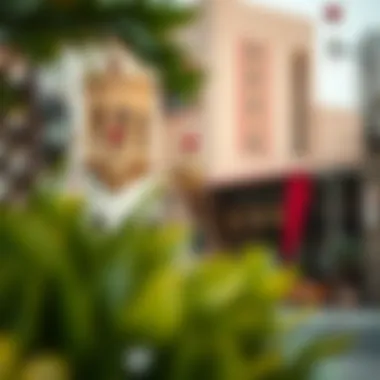
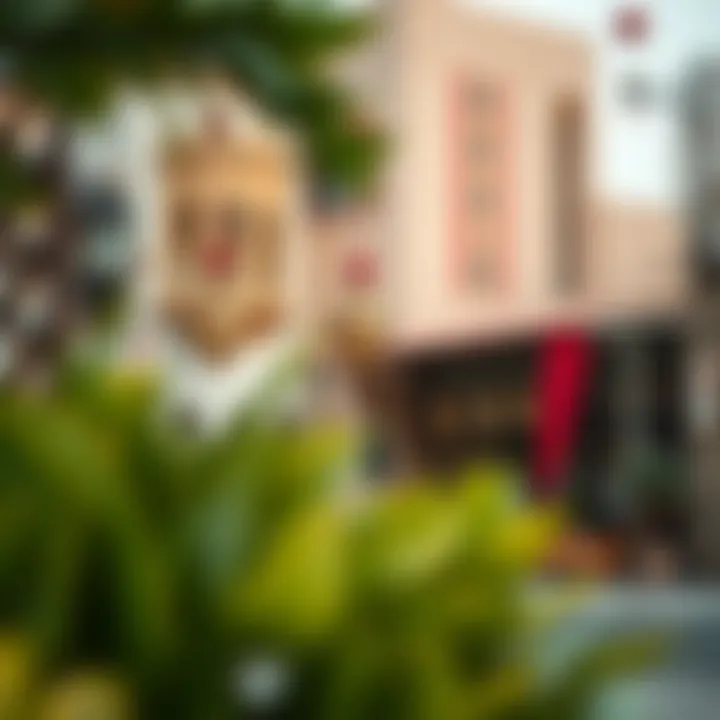
Significance of Ramadan
The significance of Ramadan extends beyond fasting; it encapsulates the spirit of charity, community, and self-discipline. For many, this month acts as a catalyst for spiritual growth and self-improvement. The act of fasting, often seen as a physical challenge, is also a moment to gather one’s thoughts and engage in self-reflection. During Ramadan, businesses in Dubai often adapt their operations, reinforcing community ties through increased charitable contributions and various social initiatives.
Engaging in local customs during this time offers investors and residents alike a glimpse into the values that steer consumer behavior. The month is characterized by slower-paced business activities coupled with an increase in social gatherings around iftar. Understanding these dynamics not only helps in navigating the market more effectively but also fosters a deeper connection to the local culture.
In summary, the Introduction to Ramadan in Dubai is pivotal for grasping the interactions between tradition and modernity. This foundational understanding will guide readers through the ensuing sections, providing insight into dates, cultural customs, and the far-reaching implications for daily life and investments during this significant time.
Ramadan Dates Overview
Understanding the key dates of Ramadan 2024 is crucial for both the local community and anyone looking to engage with Dubai during this important period. The expected start and end dates, along with the celebration of Eid al-Fitr, shape the rhythm of life in the city. For investors, buyers, and those looking to participate in the festivities, knowing these dates can help in planning activities and investments effectively.
Expected Start Date
Ramadan is estimated to begin on the evening of Sunday, March 10, 2024, depending on the sighting of the moon. This moment marks a significant transformation in daily routines, encouraging people to engage in spiritual reflection, prayer, and community activities. It’s also when businesses begin to adapt their operating hours, paving the way for a unique economic environment that investors should be keen on.
Expected End Date
Ramadan is likely to conclude on Monday, April 8, 2024. The end of Ramadan sets the stage for Eid al-Fitr, a day filled with celebration and gratitude. The precise end date will again depend on the lunar calendar, but preparations usually start well before. Recognizing this timeline can be essential for stakeholders in real estate and business, as the demand for services often spikes leading up to Eid.
Eid al-Fitr Celebration
The festival of Eid al-Fitr, expected after Ramadan ends, is anticipated to fall on Tuesday, April 9, 2024. This day is not just a relief from fasting but a showcase of communal solidarity as families come together to share meals and gifts. The vibrant celebrations offer various opportunities for real estate showings and community engagement, as many expatriates and residents participate joyfully in the festivities.
Ramadan in Dubai isn't merely about abstaining from food; it's a time for building community ties, fostering goodwill, and making strategic decisions. Investors watching these key dates can find ripe opportunities, as traditional practices blend with modern commerce, creating a unique landscape in this bustling city.
"Embracing local culture during Ramadan can lead to fruitful connections and strategic insights for savvy investors."
In short, being aware of the Ramadan 2024 dates is not just a matter of cultural respect; it is a strategic move for those who wish to navigate Dubai’s energetic marketplace efficiently.
Cultural Customs During Ramadan
Ramadan is not just a time of fasting; it's a vivid tapestry woven with cultural customs that showcase the rich heritage of Dubai. The practices adopted during this holy month reflect a fusion of spiritual devotion and community spirit, providing unique insights into the local culture. For investors and residents, understanding these customs provides a window into the social fabric of the Emirate, influencing everything from commercial activities to community interactions.
Daily Practices
The daily rhythm in Dubai during Ramadan shifts dramatically. While the sun is up, most Emiratis and residents focus on spiritual reflection, including increased prayer and Quran recitation. Fasting, which lasts from dawn until sunset, transforms eating and drinking habits and promotes a sense of unity and self-discipline.
Much of the day is spent preparing for Iftar, the evening meal breaking the fast. Merchants may adjust their hours too, opening later in the day, as the bustling activity in the late afternoon gradually fades into a vibrant evening of social gatherings.
Many families embrace collective prayer at mosques, turning these sacred spaces into community hubs where social ties are strengthened. In a city like Dubai, where diverse cultures converge, the daily practices during Ramadan often serve as a common ground for individuals from various backgrounds to come together, reinforcing a sense of belonging and mutual respect.
Community Engagement
During Ramadan, community engagement takes on an unparalleled significance. It's a period when residents come together to share in the spirit of giving. Many local organizations and charities ramp up their efforts to distribute food and aid to those in need, cementing the notion that Ramadan is a time for charity and compassion.
Events like street iftars are organized, where communities gather to break their fast together, fostering connections that transcend cultural lines. This sense of community offers a unique investment opportunity for businesses focusing on social responsibility. Participating in such initiatives not only benefits the community but also enhances a company's brand image, as socially conscious consumers gravitate towards brands that align with their values.
Iftar Traditions
Iftar traditions are as rich as they are diverse, extending far beyond mere sustenance. The meal traditionally begins with the consumption of dates and water, followed by an array of local dishes that reflect Dubai’s multicultural society. Foods like harees, shorbat adas, and samboosa are often prepared, highlighting the culinary arts prevalent in the region.
These meals present a business opportunity for local restaurants who often introduce special menus during Ramadan, capturing both locals and tourists. Notably, extravagant iftar buffets are set up in hotels, attracting those seeking a festive dining experience.
Also, larger gatherings include family and friends, where the sharing of stories and experiences fosters deeper bonds. This communal breaking of the fast emphasizes the values of sharing and togetherness, making it a cornerstone of the Ramadan experience in Dubai.
“Ramadan transforms the ordinary into a celebration of sharing and togetherness, embodying the values of community, spirituality, and cultural heritage.”
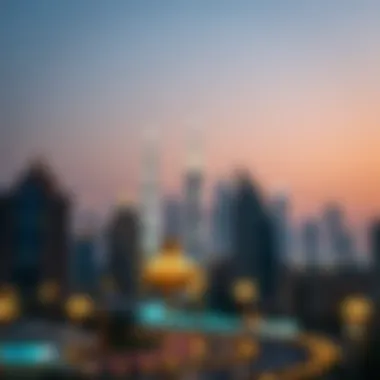
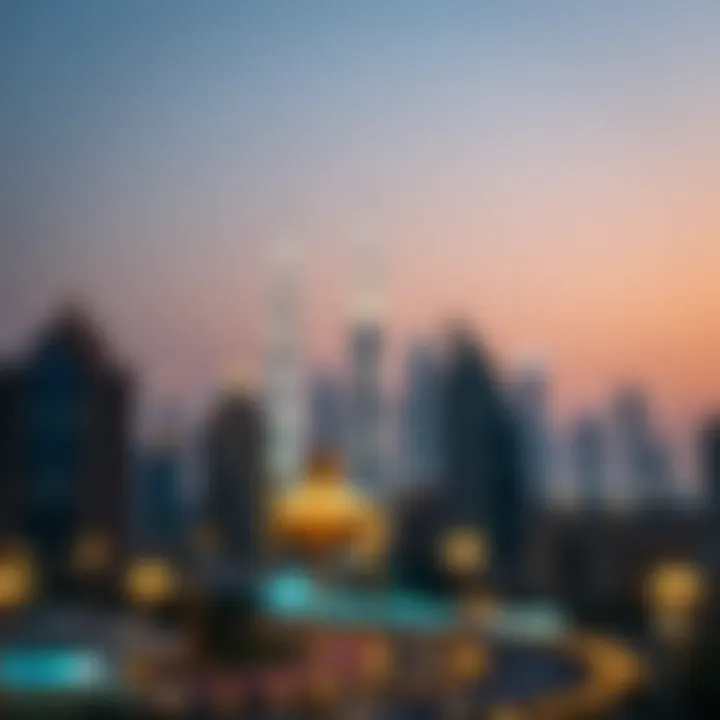
Understanding these cultural customs can significantly benefit investors and business professionals in Dubai. Recognizing the importance of community and tradition can lead to more successful interactions in both social and economic contexts, aligning strategies with the local sentiment during this special period.
Impact on Daily Life in Dubai
Ramadan in Dubai is more than just a month of fasting; it weaves itself intricately into the fabric of daily life, influencing routine, economics, and social interactions. Understanding this impact is essential not only for residents but also for investors, developers, and business managers who navigate this dynamic atmosphere. During this holy month, lifestyle changes can be significant, ranging from altered business hours to modifications in public transport schedules.
Business Hours Adjustments
As the sun sets, the pace of life shifts dramatically. Many businesses adjust their hours during Ramadan to accommodate the fasting population, which results in later openings and extended evenings. Offices often open later in the day, frequently kicking off at around 10 AM and wrapping up early evening. This change allows employees to observe the morning meal, Suhoor, before fasting begins at dawn.
During this time, every sector experiences a transformation. For example:
- Retail outlets: Many shops remain open later into the night to cater to individuals who prefer shopping after Iftar, the meal that breaks the fast.
- Restaurants and cafes: They often start serving Iftar meals at sunset, and some may even offer special packages to entice customers.
Investors in the commercial real estate sector should note these variations in business hours. The impact on customer traffic may lead to strategic decisions about leasing and operational adjustments. Understanding local customs can give investors an edge, optimizing time and resources efficiently.
Public Transport Changes
Public transport also sees significant changes during Ramadan. The Dubai Roads and Transport Authority typically revises bus, tram, and metro schedules to align with the altered rhythms of the holy month. Most notably, the metro runs later on weekends to accommodate the busy evening hours post-Iftar, offering extended service to cater to the city's bustling nightlife.
Key changes include:
- Altered service times: Transit systems may close later, while morning services might start even earlier to support the pre-dawn meals.
- Increased demand: With large gatherings for Iftar and community events, public transport often experiences a surge in ridership. This could create competition for space, and as such, timings should be planned accordingly.
Navigating these adjustments can bolster investor interactions in the transport sector. Understanding the shift in usage patterns during Ramadan can guide improved service provision, ensuring that locals and tourists alike have reliable access to transportation during this crucial time.
By recognizing these significant impacts on daily life in Dubai during Ramadan, stakeholders can make informed decisions. This pivotal month serves as a reflective time for the population while presenting unique challenges and opportunities in various sectors. Not only does it foster a deeper respect for cultural practices, but it directly impacts the landscape of business and investment activities.
Real Estate Sector During Ramadan
The real estate sector in Dubai takes on a unique flavor during Ramadan, creating a landscape ripe for investment and development opportunities. As the holy month unfolds, various dynamics come into play that can both positively and negatively impact properties, sales, and overall market activity. Understanding these intricacies is critical for anyone involved in real estate, from investors to agents.
Investor Behavior
During Ramadan, the mindset of investors often shifts. Some may pause their buying activities, initially thinking that fewer transactions occur during this time. However, rather than pulling back, savvy investors keenly assess the market with a different lens. They understand that while many individuals engage in more personal and spiritual pursuits, there's still a vibrant pulse in transactions. Investors might focus on properties linked to community life or those that offer amenities aligning with important Ramadan gatherings.
Property Viewings and Sales
In the realm of property viewings, the approach shifts during Ramadan. Open houses and viewings may not be as frequent due to fasting hours. However, many prospective buyers become more serious about their search leading up to Eid al-Fitr, seeing it as a time to solidify plans before the end of Ramadan. Real estate agents often adapt their schedules to accommodate evening viewings post-iftar, creating an opportunity for more intimate, engaged tours of properties.
Additionally, consider that certain listings may gain traction during this time, especially those with family-friendly spaces or proximity to mosques, where community gatherings take place.
Market Trends and Opportunities
The trends observed during Ramadan can serve as indicators of the broader real estate climate in Dubai. The month often stimulates a focus on community and togetherness, prompting interest in larger family homes or properties in vibrant neighborhoods. Investment opportunities may also arise from developers looking to capitalize on the festive spirit, offering promotions tied to Ramadan, such as discounts or flexible payment plans.
"Ramadan presents a unique opportunity to connect with the community and foster relationships that extend beyond mere transactions."
In summation, while some might view Ramadan as a slow period for real estate, astute investors know it can be a goldmine for identifying emerging market trends and leveraging community-focused developments. Whether it's adapting viewing schedules post-iftar or delving deeper into community desires, the landscape reveals layers of potential worth examining.
Challenges Faced During Ramadan
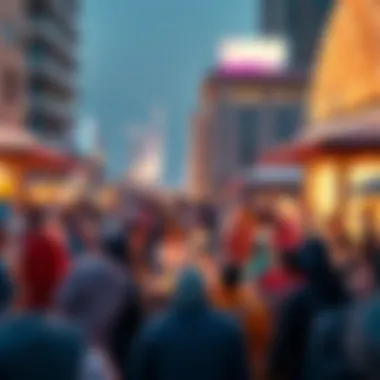
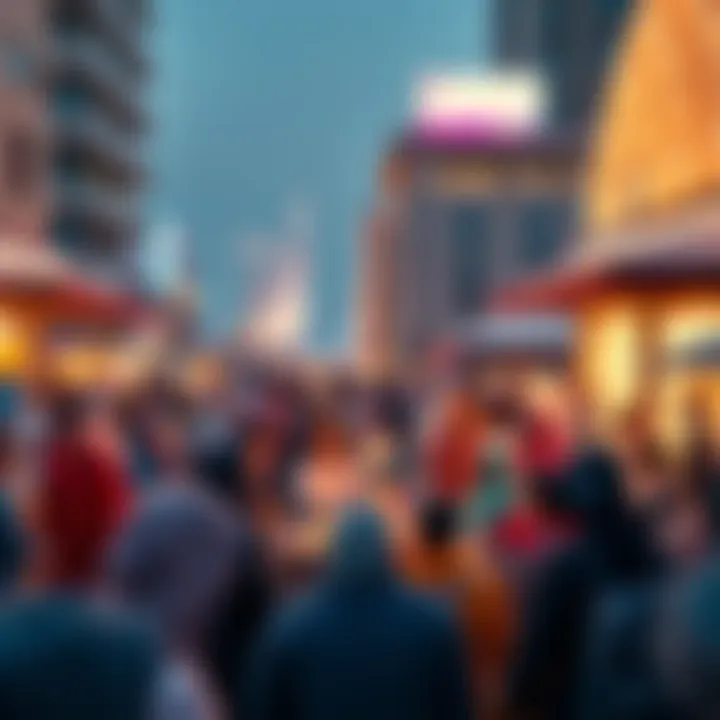
As the Holy Month of Ramadan approaches, it brings a unique set of challenges to Dubai's social and economic landscape. Understanding these challenges is crucial for investors, property managers, agents, and residents who aim to navigate this time effectively. These challenges not only affect daily life but can also influence investment decisions and business strategies.
Economic Adjustments
During Ramadan, the economic environment shifts in noticeable ways. Businesses and investors must be alert to these changes to plan accordingly. For instance, the demand for certain goods, primarily food and beverages, tends to spike as more Muslims break their fast at sunset. This increase often leads to dynamic pricing strategies. Outlets that prepare Iftar meals experience heightened activity, causing some small businesses to thrive, while others may struggle to adjust to this seasonal demand.
Additionally, sectors like hospitality and retail may face economic adjustments in terms of operating hours. Many restaurants switch to shorter service windows during the day, and this inevitably squeezes revenues for some before Iftar begins.
On another note, labor markets see shifts, as many workers adhere to shorter working hours. This can lead to reduced productivity in various sectors—though it also presents opportunities for companies flexible enough to adapt their schedules. In real estate, understanding tenant expectations becomes paramount; for instance, the timing of property viewings may need to be adjusted to accommodate fasting schedules. Keeping a finger on the pulse of these economic currents can provide investors with a competitive edge.
Regulatory Changes
Ramadan also brings about regulatory changes that can affect businesses and individuals alike. The local government often enforces special regulations aimed at maintaining respect for the fasting month. For example, strict guidelines are put in place regarding noise levels, with restrictions enforced on music and other noisy activities during daylight hours. Investors must familiarize themselves with these rules to avoid fines or other repercussions.
Moreover, these regulations can affect business permits, advertisement approval, and public events. Any promotions or campaigns that do not align with the spirit of Ramadan may be closely scrutinized or even rejected. This necessitates a nuanced approach to marketing strategies, as businesses must find ways to promote their offerings respectfully, while still appealing to consumers’ needs during this time.
It's also worth noting that alterations in labor laws may take effect. Companies might need to comply with changes related to work hours and employee welfare conditions during Ramadan, making it crucial for managers to stay updated on local regulations.
In summary, while Ramadan is a period of deep significance, it also presents various challenges that can impact daily life and business environments in Dubai. By recognizing the economic adjustments and regulatory shifts that occur during this month, stakeholders can better prepare for the impact of Ramadan and seize the opportunities it brings.
Navigating Ramadan for Investors
Understanding Ramadan's unique landscape is essential for anyone looking to navigate investments in Dubai during this holy month. Investors, whether local or international, can significantly benefit from grasping the cultural and economic adjustments that take place. As Ramadan shapes consumer behavior, it becomes pivotal to align strategies accordingly, maximizing potential returns while respecting local traditions.
Investors need to remember that Ramadan is not merely a month of fasting, but also a period where family gatherings, community spirit, and charitable activities are at the forefront. This cultural backdrop influences buyer behavior, market demand, and business operations. For those in the real estate sector, recognizing these nuances can spell the difference between profit and loss.
Effective Strategies
- Timing Your Investments: It is important to consider the timing of your investment decisions during Ramadan. Generally, the market slows slightly during the earlier weeks of Ramadan as potential buyers might focus on family and religious observances. However, as the month progresses towards Eid al-Fitr, buyer eagerness often resurfaces, leading to increased demand. Sending out marketing messages or launching new projects towards the end of Ramadan can align perfectly with this heightened interest.
- Tailored Marketing Approaches: Understanding how to communicate during this period is essential. Investors should tailor their marketing strategies to resonate with the values of Ramadan. Focus on messaging that emphasizes community, family, and mindfulness. This approach will create a deeper connection with potential clients.
- Flexible Financing Options: Offering flexible financing arrangements can entice buyers, particularly during Ramadan when many are managing their finances closely. Special offers, discounts on fees, or deferred payment options can appeal greatly to buyers looking for value, turning inquiries into actual sales.
Networking Opportunities
Ramadan presents a golden opportunity to forge new connections and deepen existing ones within the real estate sector.
- Community Events: Many local communities organize Iftar gatherings and charity events during Ramadan. Participation in such events allows investors and developers to connect on a more personal level with potential clients, partners, and even competitors. It’s a chance to showcase understanding and respect for the local culture while expanding your network.
- Online Networking Platforms: With many relying on digital communication, leveraging online platforms like LinkedIn or specialized real estate forums can keep the conversation going. Engaging in discussions about Ramadan related topics can help forge relationships that may lead to partnership opportunities down the line.
- End-of-Ramadan Networking: As Ramadan culminates in Eid al-Fitr, many businesses hold special events, and networking opportunities abound. This time can be critical for presenting new projects or ideas, capitalizing on the elevated spirit of celebration and community.
"In Dubai, Ramadan is not solely a month of fasting; it's a potent time of social and economic engagement, especially for investors. Understanding these dynamics can turn potential hurdles into stepping stones."
In summary, while Ramadan may present its own set of challenges and shifts in behavior, savvy investors who prepare and align their strategies effectively can create significant opportunities. By understanding the cultural context and the timing of investments, one can not only navigate but thrive during this holy month.
Finale: Ramadan's Influence on Dubai
As Ramadan approaches in 2024, it's essential to grasp its multifaceted role in shaping Dubai's cultural, economic, and social landscape. The significance of this holy month extends beyond the spiritual essence; it weaves a tapestry of unity and shared values among the residents. Ramadan brings diverse communities together, cultivating a spirit of generosity and compassion. During this month, whether it's by sharing iftar with neighbors or contributing to charitable causes, the act of coming together paints a vivid picture of cultural cohesion. For investors and businesses, understanding this social fabric can offer strategic insights.
Reflection on Cultural Cohesion
In a bustling metropolis like Dubai, which thrives on its multicultural environment, Ramadan serves as a common thread. This shared experience encourages interactions across different nationalities and faiths. Streets light up with festivities, creating an atmosphere of warmth and inclusion. The local customs practiced during Ramadan—from communal iftars to nightly prayers—foster a strong sense of belonging among residents.
- Boosts Community Engagement: Local organizations and businesses often host events that invite everyone to participate in Ramadan celebrations, breaking down barriers and bridging gaps between communities.
- Shared Traditions: The observance of fasting and evening meals creates a rhythm that harmonizes daily activities and routines, enhancing collective experiences.
"Ramadan is not just about fasting; it’s about experiencing kindness and generosity with those around us."
Looking Ahead to Eid al-Fitr
As Ramadan draws to a close, all eyes shift toward Eid al-Fitr, marking the end of fasting. This joyous occasion signifies new beginnings and reinforces communal bonds. For investors, the period following Ramadan can be a time ripe with opportunities. As consumer spending often surges, especially on celebrations and gifts, understanding market dynamics becomes critical.
- Economic Boost: Businesses, particularly in retail and hospitality sectors, can capitalize on this surge through tailored promotions and special offers aimed at both locals and tourists.
- Insightful Analysis: Investors evaluating the real estate market may find that property values see fluctuations tied closely to the emotional and economic impact of Eid celebrations.

